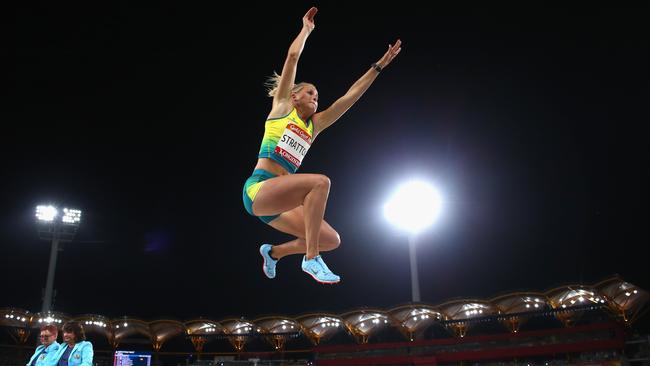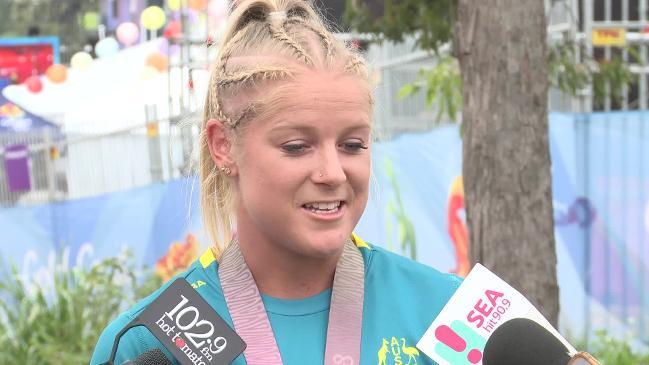Tokyo 2020 Olympics: Brooke Stratton vows to use the extra year to her advantage
She’s battled coeliac disease, stress fractures in her back and a thyroid disease — and now coronavirus has put long jumper Brooke Stratton’s Olympic ambitions on ice. But the champion is treating it as a “reset”, not a shattered dream.

Local Sport
Don't miss out on the headlines from Local Sport . Followed categories will be added to My News.
Like a uni student who’s suddenly had an end-of-year exam cancelled and can now do some extra cramming, Australia’s No. 1 long jumper, Knoxfield’s Brooke Stratton, has vowed to use the Tokyo Olympics’ one-year delay to train even harder and make every post a winner when she does eventually take to the runway.
With the COVID-19 cloud sweeping across the world, organisers of the Tokyo Olympics were forced to postpone the event until July 23 – August 8 next year. The day before that announcement, the Australian Olympic Committee had said it would not be sending a team.
Initially the decision was shattering for the 26-year-old.
The national record holder since 2016 at 7.05m, an Olympic finalist in Rio de Janeiro in 2016 and the silver medallist at the Gold Coast Commonwealth Games two years ago, the chance to shine on the Tokyo stage loomed brightly.
“For so long they’d been umming and ahhing about it,” she said. “For me, I was just holding on to the hope that it was going to go ahead.
“But there’s much more important things going on now and the health issues are far more important. It’s a worldwide issue, it’s not just us Aussies that are missing out.
“Now we re-set, we re-focus and we go back to basic training.
“You’ve got another year, it’s not cancelled, they haven’t taken it away from us.”
MORE SPORTS NEWS
STRANDED US PLAYERS HELPING BASKETBALL DOWNUNDER
NBL1 SEASON CANCELLED, FOCUS ON GRASSROOTS

And while adjusting their training programs will be frustrating, Olympic athletes are human too.
“It’s hard not being able to do the normal things in life,” Stratton said. “It would be nice to go to the movies or something, wouldn’t it?”
Stratton is better equipped than most to cope with the disappointment of having a 12-month delay slapped on her Olympic Dreams.
She’s been clearing hurdles for nigh on a decade.
She’d been hampered by coeliac disease for years until it was diagnosed in 2013 and then stress fractures in her lower back sidelined her from the 2014 Glasgow Commonwealth Games. And a year or so ago she was diagnosed with Hashimoto’s disease, a condition that affects the thyroid gland and left her physically and emotionally drained.
Somehow, Stratton has always been able to chart her way through stormy waters.
“I feel that I don’t get affected as much as others because I am able to see the positives in things like this,” she said. “With the Olympics, we’ve got another chance, it hasn’t been taken away from us.
“You’ve just got to use it to your advantage and work on all those one-percenters. I was planning to be in personal best form for Tokyo, I will still be in personal best form.”


Like the rest of us, the COVID-19 lockdown means Stratton has been forced to modify her life — training in particular.
“I’ll be doing gym sessions from home,” she said. “So we’ve set a gym up in the garage.
“We’re not allowed to access the facilities at the VIS, and we’re not allowed to train at the athletics track. So I’ll do all my running on a treadmill or on the local oval.
“I’ve still got another chance.
“If anything, pushing it back a year probably helps me. I’ll be another year stronger.”
